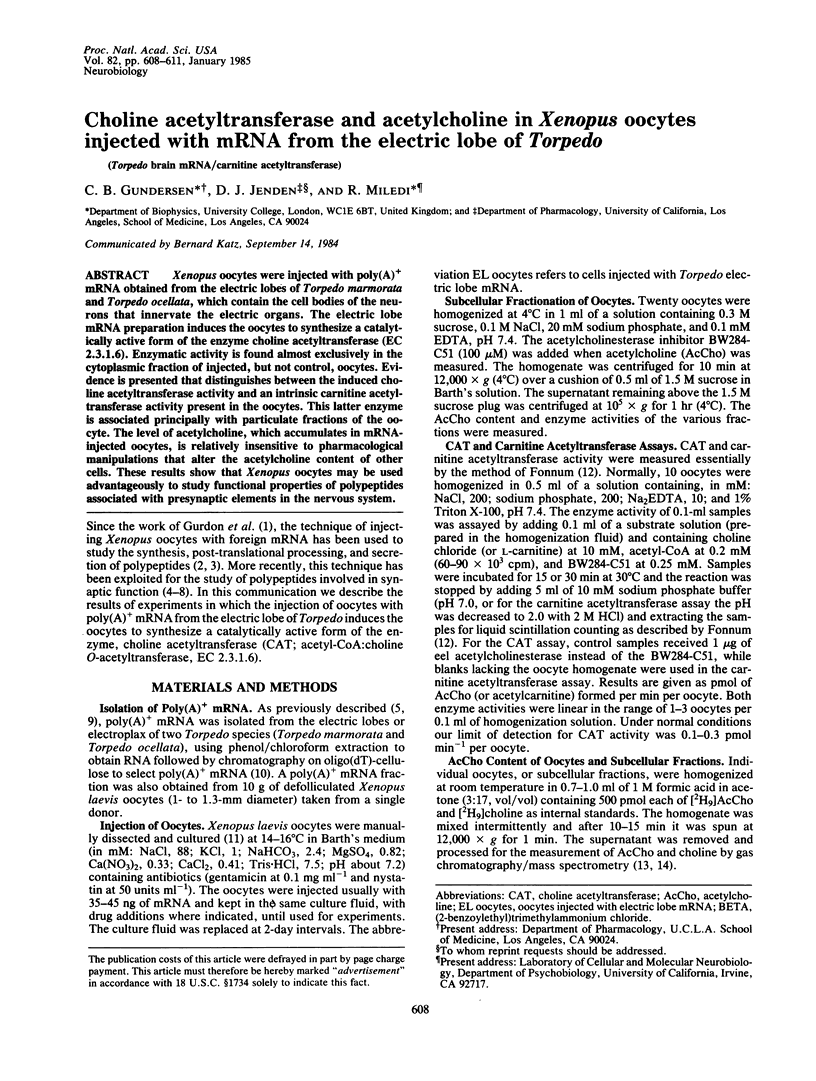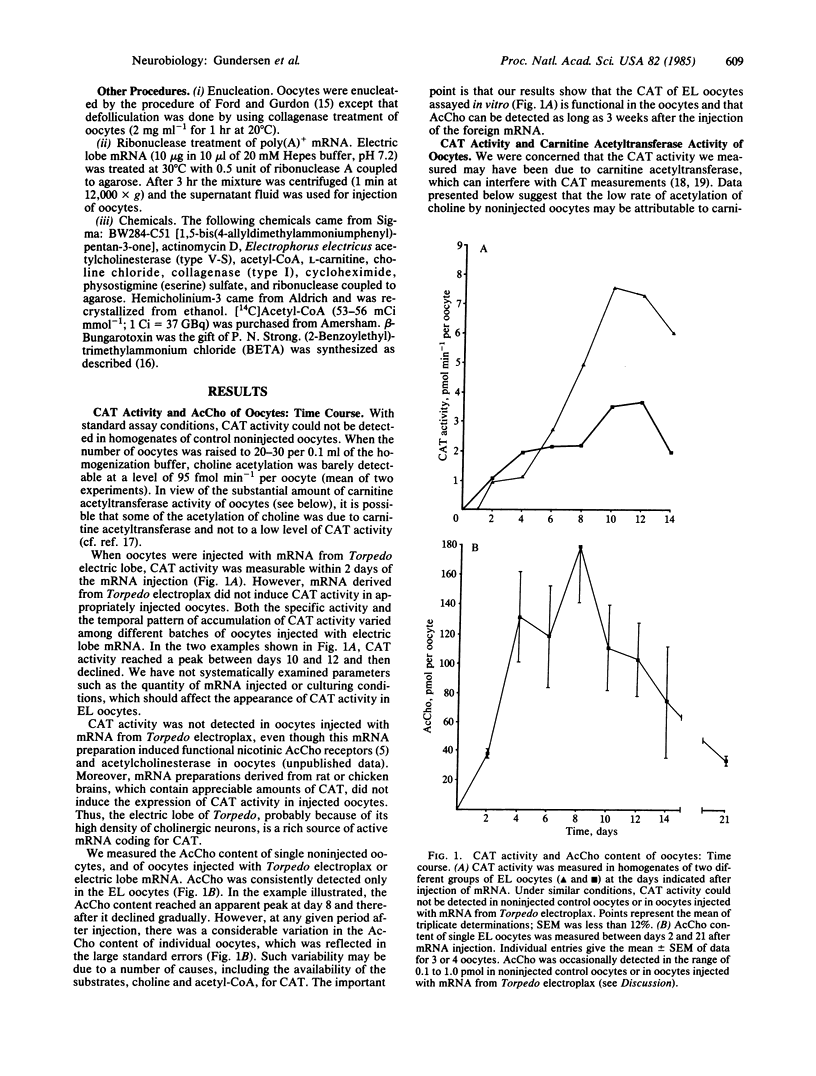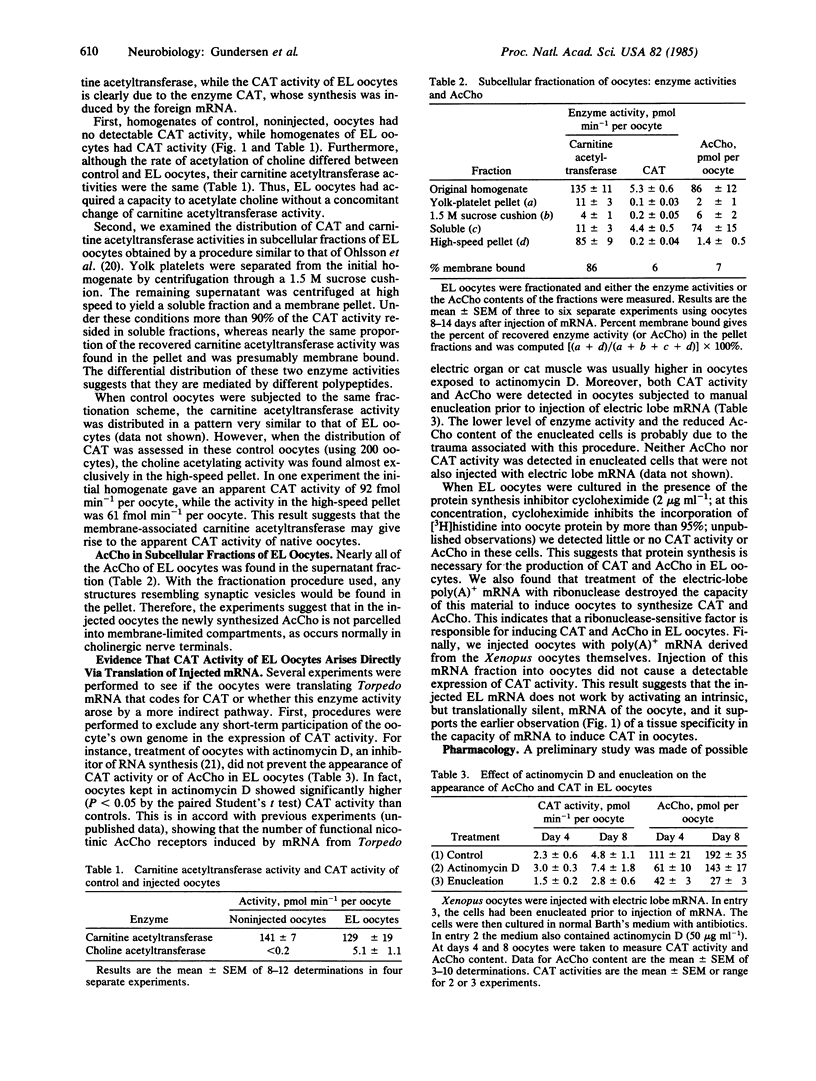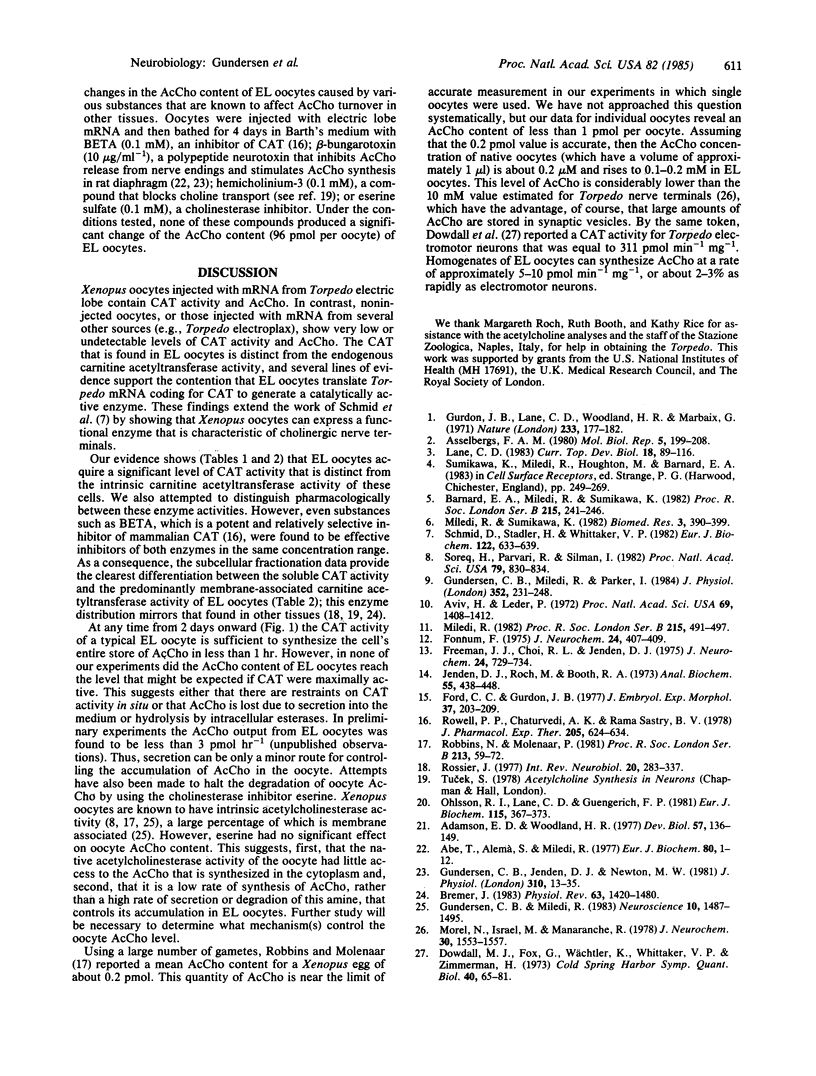Abstract
Xenopus oocytes were injected with poly(A)+ mRNA obtained from the electric lobes of Torpedo marmorata and Torpedo ocellata, which contain the cell bodies of the neurons that innervate the electric organs. The electric lobe mRNA preparation induces the oocytes to synthesize a catalytically active form of the enzyme choline acetyltransferase (EC 2.3.1.6). Enzymatic activity is found almost exclusively in the cytoplasmic fraction of injected, but not control, oocytes. Evidence is presented that distinguishes between the induced choline acetyltransferase activity and an intrinsic carnitine acetyltransferase activity present in the oocytes. This latter enzyme is associated principally with particulate fractions of the oocyte. The level of acetylcholine, which accumulates in mRNA-injected oocytes, is relatively insensitive to pharmacological manipulations that alter the acetylcholine content of other cells. These results show that Xenopus oocytes may be used advantageously to study functional properties of polypeptides associated with presynaptic elements in the nervous system.
Full text
PDF



Selected References
These references are in PubMed. This may not be the complete list of references from this article.
- Abe T., Alemá S., Miledi R. Isolation and characterization of presynaptically acting neurotoxins from the venom of Bungarus snakes. Eur J Biochem. 1977 Oct 17;80(1):1–12. doi: 10.1111/j.1432-1033.1977.tb11849.x. [DOI] [PubMed] [Google Scholar]
- Adamson E. D., Woodland H. R. Changes in the rate of histone synthesis during oocyte maturation and very early development of Xenopus laevis. Dev Biol. 1977 May;57(1):136–149. doi: 10.1016/0012-1606(77)90360-8. [DOI] [PubMed] [Google Scholar]
- Asselbergs F. A. Post-synthetic fate of the translation products of messenger RNA microinjected into Xenopus oocytes. Mol Biol Rep. 1979 Dec 31;5(4):199–208. doi: 10.1007/BF00782889. [DOI] [PubMed] [Google Scholar]
- Aviv H., Leder P. Purification of biologically active globin messenger RNA by chromatography on oligothymidylic acid-cellulose. Proc Natl Acad Sci U S A. 1972 Jun;69(6):1408–1412. doi: 10.1073/pnas.69.6.1408. [DOI] [PMC free article] [PubMed] [Google Scholar]
- Barnard E. A., Miledi R., Sumikawa K. Translation of exogenous messenger RNA coding for nicotinic acetylcholine receptors produces functional receptors in Xenopus oocytes. Proc R Soc Lond B Biol Sci. 1982 May 22;215(1199):241–246. doi: 10.1098/rspb.1982.0040. [DOI] [PubMed] [Google Scholar]
- Bremer J. Carnitine--metabolism and functions. Physiol Rev. 1983 Oct;63(4):1420–1480. doi: 10.1152/physrev.1983.63.4.1420. [DOI] [PubMed] [Google Scholar]
- Dowdall M. J., Fox G., Wächtler K., Whittaker V. P., Zimmermann H. Recent studies on the comparative biochemistry of the cholinergic neuron. Cold Spring Harb Symp Quant Biol. 1976;40:65–81. doi: 10.1101/sqb.1976.040.01.009. [DOI] [PubMed] [Google Scholar]
- Fonnum F. A rapid radiochemical method for the determination of choline acetyltransferase. J Neurochem. 1975 Feb;24(2):407–409. doi: 10.1111/j.1471-4159.1975.tb11895.x. [DOI] [PubMed] [Google Scholar]
- Ford C. C., Gurdon J. B. A method for enucleating oocytes of Xenopus laevis. J Embryol Exp Morphol. 1977 Feb;37(1):203–209. [PubMed] [Google Scholar]
- Freeman J. J., Choi R. L., Jenden D. J. Plasma choline: its turnover and exchange with brain choline. J Neurochem. 1975 Apr;24(4):729–734. [PubMed] [Google Scholar]
- Gundersen C. B., Jenden D. J., Newton M. W. Beta-bungarotoxin stimulates the synthesis and accumulation of acetylcholine in rat phrenic nerve diaphragm preparations. J Physiol. 1981 Jan;310:13–35. doi: 10.1113/jphysiol.1981.sp013535. [DOI] [PMC free article] [PubMed] [Google Scholar]
- Gundersen C. B., Miledi R. Acetylcholinesterase activity of Xenopus laevis oocytes. Neuroscience. 1983 Dec;10(4):1487–1495. doi: 10.1016/0306-4522(83)90129-x. [DOI] [PubMed] [Google Scholar]
- Gundersen C. B., Miledi R., Parker I. Slowly inactivating potassium channels induced in Xenopus oocytes by messenger ribonucleic acid from Torpedo brain. J Physiol. 1984 Aug;353:231–248. doi: 10.1113/jphysiol.1984.sp015333. [DOI] [PMC free article] [PubMed] [Google Scholar]
- Gurdon J. B., Lane C. D., Woodland H. R., Marbaix G. Use of frog eggs and oocytes for the study of messenger RNA and its translation in living cells. Nature. 1971 Sep 17;233(5316):177–182. doi: 10.1038/233177a0. [DOI] [PubMed] [Google Scholar]
- Jenden D. J., Roch M., Booth R. A. Simultaneous measurement of endogenous and deuterium-labeled tracer variants of choline and acetylcholine in subpicomole quantities by gas chromatography-mass spectrometry. Anal Biochem. 1973 Oct;55(2):438–448. doi: 10.1016/0003-2697(73)90134-6. [DOI] [PubMed] [Google Scholar]
- Lane C. D. The fate of genes, messengers, and proteins introduced into Xenopus oocytes. Curr Top Dev Biol. 1983;18:89–116. doi: 10.1016/s0070-2153(08)60580-3. [DOI] [PubMed] [Google Scholar]
- Miledi R. A calcium-dependent transient outward current in Xenopus laevis oocytes. Proc R Soc Lond B Biol Sci. 1982 Jul 22;215(1201):491–497. doi: 10.1098/rspb.1982.0056. [DOI] [PubMed] [Google Scholar]
- Morel N., Israel M., Manaranche R. Determination of ACh concentration in torpedo synaptosomes. J Neurochem. 1978 Jun;30(6):1553–1557. doi: 10.1111/j.1471-4159.1978.tb10492.x. [DOI] [PubMed] [Google Scholar]
- Ohlsson R. I., Lane C. D., Guengerich F. P. Synthesis and insertion, both in vivo and in vitro, of rat-liver cytochrome P-450 and epoxide hydratase into Xenopus laevis membranes. Eur J Biochem. 1981 Apr;115(2):367–373. doi: 10.1111/j.1432-1033.1981.tb05247.x. [DOI] [PubMed] [Google Scholar]
- Robbins N., Molenaar P. C. Investigation of possible cholinergic mechanisms in fertilization of Xenopus eggs. Proc R Soc Lond B Biol Sci. 1981 Sep 17;213(1190):59–72. doi: 10.1098/rspb.1981.0053. [DOI] [PubMed] [Google Scholar]
- Rossier J. Choline acetyltransferase: a review with special reference to its cellular and subcellular localization. Int Rev Neurobiol. 1977;20:283–337. doi: 10.1016/s0074-7742(08)60656-x. [DOI] [PubMed] [Google Scholar]
- Rowell P. P., Chaturvedi A. K., Sastry B. V. (2-Benzoylethyl)trimethylammonium chloride: a new, selective and stable inhibitor of human placental choline acetyl transferase. J Pharmacol Exp Ther. 1978 Jun;205(3):624–634. [PubMed] [Google Scholar]
- Schmid D., Stadler H., Whittaker V. P. The isolation, from electromotor neurone perikarya, of messenger RNAs coding for synaptic proteins. Eur J Biochem. 1982 Mar 1;122(3):633–639. doi: 10.1111/j.1432-1033.1982.tb06486.x. [DOI] [PubMed] [Google Scholar]
- Soreq H., Parvari R., Silman I. Biosynthesis and secretion of catalytically active acetylcholinesterase in Xenopus oocytes microinjected with mRNA from rat brain and from Torpedo electric organ. Proc Natl Acad Sci U S A. 1982 Feb;79(3):830–834. doi: 10.1073/pnas.79.3.830. [DOI] [PMC free article] [PubMed] [Google Scholar]


